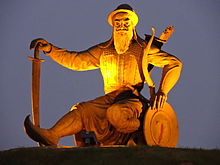Banda Bahadur
| Banda Singh Bahadur ਬੰਦਾ ਸਿੰਘ ਬਹਾਦਰ |
|
|---|---|

Statue of Baba Banda Singh Bahadur at Chappar Chiri
|
|
| Born |
Lachman Dev 27 October 1670 Rajauri, Jammu |
| Died |
9 June 1716 (aged 45) Delhi, Mughal Empire |
| Nationality | Sikh |
| Other names | Gurbakhsh Singh |
| Years active | 1708-1716 |
| Known for |
|
| Successor | Chhajja Singh Dhillon |
| Children | 1 (Ajai Singh) 2 (Ranjeet Singh) |
Banda Singh Bahadur (born Lachman Dev, also known simply as Banda Bahadur,Banda Singh, Lachman Das and Madho Das; 27 October 1670 – 9 June 1716, Delhi) was a Sikh military commander.
At age 15 he left home to become an ascetic, and was given the name ‘’Madho Das’’. He established a monastery at Nānded, on the bank of the river Godāvarī, where in September 1708 he was visited by, and became a disciple of, Guru Gobind Singh, who gave him the new name of Banda Bahadur. Armed with the blessing and authority of Guru Gobind Singh, he assembled a fighting force and led the struggle against the Mughal Empire.
His first major action was the sack of the Mughal provincial capital, Samana, in November 1709. After establishing his authority in Punjab, Banda Singh Bahadur abolished the zamindari system, and granted property rights to the tillers of the land. He was captured by the Mughals and tortured to death in 1716.
There are different views regarding the origin of Banda Singh Bahadur:
After a meeting with Guru Gobind Singh on 3 September 1708, he became a Sikh. The guru ordered him to go to Punjab and fight the Mughals with the help of the Sikh army. Banda Singh Bahadur first camped in Khanda, Sonipat.Kaithal.
In 1709 he defeated Mughals in the Battle of Samana and captured the Mughal city of Samana, killing about 10,000 Mohammedans.
Samana minted coins. With this treasury the Sikhs became financially stable. The Sikhs soon took over Mustafabad and Sadhora (near Jagadhri). The Sikhs then captured the Cis-Sutlej areas of Punjab, including Malerkotla and Nahan.
...
Wikipedia
